By Prof. Grigorios Larentzakis
With the death of Pope Benedict XVI, a great ecclesiastical personality of the Church of Christ, who left his indelible marks in the 20th and 21st centuries, left the earth. I do not wish to make a general assessment. It would be a great dare, because his course and his views were multifaceted and not infrequently controversial and sometimes provocative. Let others judge, history is always a fair judge, sooner or later.
In the following remarks, I would like to refer to certain aspects of his thinking and his activities, which concern us, as they also concern the course of the restoration of the ecclesiastical communion, events which certainly should not be ignored or forgotten. I also refer to personal experiences.
Professor and Cardinal Joseph Ratzinger and Pope Benedict XVI was not only an excellent theologian of Catholic Theology, but also a deep connaisseur of the theology of the Great Fathers of our Church and more generally of the Orthodox Theology and the Orthodox Church. In his theological writings, the influence of the theology of our Fathers and of our Church, which he valued and loved as he himself confessed publicly at the Ecumenical Vespers in Regensburg (12.9.2006) during his visit there.
What he mentioned at the beginning of his sermon is interesting: “The Ecumenical Movement needs personal meetings. With all my heart, I would like to first of all greet the participants in this Ecumenical Vesper from the Orthodox Church. I always consider it as a great gift of Divine Providence, because I, as a Professor in Bonn, got to know and love the Orthodox Church from two Archimandrites, (who were his students), the late Metropolitans Stylianos Harkianakis and Damascene Papandreou, (with whom he was connected until the end with close friendship), i.e. personally and from specific persons. In Regensburg, other personal meetings were added at the initiative of the bishop Graber there at the Ecumenical Symposia at the Spindlhof. Other Orthodox scholars also studied there in Regensburg. I am especially happy because today I see familiar faces from back then and our friendship is renewed.”
In fact, I too had been invited there in Regensburg, among others, first of all, the Metropolitan Augustinos of Germany, Professor Evangelos Theodorou and others, because we had repeatedly taken part in the Ecumenical Symposia in Regensburg. To confirm what was said by the Pope about his friendly feelings, I mention a small moment that happened inside the Church after the end of the Ecumenical Vespers Service. As the Pope departed in procession towards the exit of the Church and standing in front of where I was with Professor Evangelos Theodorou, he stopped, left the line of the procession and approached us, greeted us by shaking hands, asked us what we were doing and said that he was happy for our meeting. Then he returned to the procession, which was waiting for him. Such a functional “irregularity” is obviously not self-evident. Perhaps some commenters are thinking, what happened? However, even this gesture has a symbolic character, if it is taken into account that all of this was televised live to the entire world.
Therefore, he valued the Orthodox Church and Orthodox theology so much that he considered it necessary to enrich Western Theology with the patristic thought of the East and with Orthodox theology, something that he himself had done, as is evident in his writings.
He also considered one-sided the effort to restore Church unity only by promoting relations between the Roman Catholic and Evangelical Churches and the holding of the theological dialogue only between the theologians of their Churches in the West. For this reason, he strongly sought the expansion of the relations of the Western Churches with the participation of the Orthodox Church and theology, not only to include the Orthodox Church, but also because by entering into theological dialogue with Orthodox theology, the resolution of western theological problems will be facilitated. He expressed this opinion in his introduction to the book of Metropolitan Stylianos Harkianakis entitled “Orthodox Church and Catholicism”, “Orthodoxe Kirche und Katholizismus”. There he emphasized: “For Roman Catholic theology in Germany, the Ecumenical Movement meant for a long time only Catholic/Protestant Dialogue. The Orthodox Church was like living in another star, locally and spiritually almost unapproachable. Sometimes someone in the West was excited by the xenophanous glow and the ancient Orthodox Liturgy, but this enthusiasm referred to the exotic foreigner and remained there. Surely a silent arrogance played a role, which was related to the Western way of thinking, which considered itself to be at the height of contemporary thought and waited for the East to reach the same height.
In the meantime, thank God, many things have changed. The entry of Orthodoxy into the World Council of Churches showed the living and dynamic existence of the Faith and Tradition of the Eastern Orthodox Church in a Forum, much more than anyone expected because the Anglo-Saxon mentality dominated this Forum. Many, which failed in the Dialogue between the Roman Catholic and the Evangelical Church, now with the participation of Orthodoxy it was seen that positive results are achieved immediately. The fact that Holy Scripture and Tradition constitute unity, an old theological difference, which now seems to be resolved, also the Catholic teaching on Mysteries, etc. All of these were treated more amicably, more understandably, because they came from the Orthodox Church, rather than if they remained in the classic dispute of centuries between the Roman Catholic and Protestant Churches. The Ecumenical Dialogue gained with the participation of the third contracting party (the Orthodox Church) wider dimensions, depth, but also hope”.
These findings of Cardinal Ratzinger/Pope Benedict on the importance of the Orthodox Church and Theology and with intense self-criticism, really gave a dynamic attitude to the West to turn towards the Orthodox Church with significant positive ecumenical consequences. This contribution of his should not be ignored by our Church.
Also, his contribution to the official Theological Dialogue between our sister Churches, the Roman Catholic and the Orthodox, and to the final formulation of the first official texts, which they have signed jointly during the year, when he was Co-President of this official Theological Dialogue and when the Co-President from the Orthodox side was his former student and friend Metropolitan Stylianos Harkianakis.
Here I will also refer to a specific problem, which is still the biggest obstacle to the restoration of the full ecclesiastical communion of our Churches: the papal primacy.
Even as a professor in Regensburg he dealt with this issue and came to very important conclusions, which can be used as a starting point for the solution of this serious problem.
The occasion for this activity was given by the greeting of the Ecumenical Patriarch Athenagoras to Pope Paul VI in Constantinople during his visit on July 25, 1967. Among other things, the Patriarch said: “And here we have, beyond all human expectation. in our midst the Bishop of Rome, the first and foremost honor among us, the “one who presides in love” (Ignatius of Antioch, Epistle to the Romans, Prologue, PE 5, 801).” This greeting of Patriarch Athenagoras and the opinion of Saint Ignatius of Antioch about the Church of Rome was used as a basis by the Professor and later Cardinal and Pope and not on one-sided Western sources, in order to reach his important conclusion in a historic speech pronounced in Graz of Austria on January 26, 1976, where we had invited him together with the Professor of Athens Evangelos Theodorou for the event of the decade after the “removal” of the Anathemas of 1054. Among other things, he emphasized: “On the other hand, whoever is inside the Catholic Church it is impossible to characterize the form of the 19th and 20th century primary as the only possible and as binding for all Christians. The symbolic acts of Pope Paul VI and the last kneeling before the representative of the Ecumenical Patriarch confirm the above statement exactly and get us out of the impasse of developments. Even if we cannot stop history and retrace the path of the centuries, one can still say that what was possible for an entire millennium cannot be impossible for Christians today. However, in the year 1054 Cardinal Humbert da Silva Candida in the same bull, with which he excommunicated Patriarch Cerularius and with which started the schism between East and West, characterized the Emperor and the citizens of Constantinople as “very pious and orthodox”, although their understanding of the Roman Primate certainly differed much less than that of Cerularius, [and much more] than that of the First Vatican. In other words: Rome should not demand from the East, as far as the teaching about the Primacy is concerned, nothing more than what was formulated and experienced in the first millennium. When Patriarch Athenagoras on 25 July 1967 characterized the Pope during his visit to the Phanar as the successor of Peter, the first in honor among us [and] the one who presides in love, the essential content was mentioned through the mouth of that great ecclesiastical leader of the teaching about the papal primacy of the first millennium and beyond that Rome should not demand anything.” And on another occasion in Vienna in April 1974, Professor Ratzinger emphasized that with this greeting, Patriarch Athenagoras “did not abandon the positions and views of the Orthodox Church, nor did he accept the Western Primate of authority.”
These views of Professor and Cardinal Ratzinger have not lost their power and relevance, despite the fact that unfortunately he could not implement them himself from the position of the bishop and Pope of Rome. However, they remain as a serious legacy for his Successors and for the next generations, even if there are different conservative views on the same issue.
Worth mentioning is the visit of Pope Benedict to Constantinople when he visited the Ecumenical Patriarch Bartholomew and celebrated the Thronal feast of Saint Andrew on November 30, 2006. I had the pleasure and honor to be invited to this historic event and to experience these moments personally of the cordial and fraternal meeting of the Leaders of our two sister Churches.
In the speeches of the two Primates and in the Joint Declaration, the brotherhood, the cordiality and the pleasant friendly atmosphere of this fraternal meeting are reflected.
With strong symbolism, Pope Benedict said that the Apostle Andrew led Peter to Christ. The final goal of all ecumenical efforts and the Theological Dialogue is the revival of the full ecclesiastical and sacramental communion, Pope Benedict emphasized. And in the Joint Declaration the same decisive will was emphasized, the lifting of the anathemas of 1054, but also the finding that all the possibilities of promoting the relations of the two sister Churches, which arise from this lifting, have not yet been exhausted.
And this visit of the Pope to the see of the Ecumenical Patriarchate will remain an important historical event in the relations between the two Churches, just as all the other initiatives and collaborations on the path to full unity and the visits of the Ecumenical Patriarch to the see of the Elder Rome remain important. Bartholomew, who referred to the falling asleep of the Pope “with respect and love and gratitude”. And in his letter of condolence to Pope Francis for the repose of Pope Benedict, he mentioned, among other things: “However, his memorable contributions not only to Your Church, but in academia – being one of the greatest theologians of the 20th century – and in building bridges – evident in his commitment to dialogue, especially with the Orthodox Church – will undeniably leave their mark in history. Relatedly, we sincerely valued his visit to our Sacred Centre here at the Phanar in 2006 and cherished our numerous visits to him at the Vatican”.
Everything about Pope Benedict XVI awaits their most detailed scientific evaluation in the ecclesiastical life of the Christian pleroma, despite the imperfections in this long-term course. The Ecumenical Dialogue, which he served and promoted, must continue with courage and optimism. It is not only his bequest, but also the will of Jesus Christ in his last prayer.
May God rest his “servant” Benedict XVI, bishop and Pope of Rome. May his memory be eternal!
— Grigorios Larentzakis is Professor emeritus of the University of Gratz and Archon Grand Protonotary of the Ecumenical Patriarchate. Born in Chania (Crete, Greece), he graduated in 1965 from the theological faculty of Halki (Istanbul, Turkey) and then studied Catholic theology in Austria, first from 1965 to 1966 in Salzburg and later in Innsbruck where in 1969 he was the first non-Catholic theologian to receive a doctorate in Catholic theology. From 1970, he taught orthodox and ecumenical theology at the Catholic Theological Faculties of the Universities of Graz and of Vienna. Having received his doctorate in orthodox theology from the Aristotle University of Thessaloniki in 1983, he was appointed professor in Graz in 1987. He also taught at the Catholic Theological Private University Linz (1983-1984) and at the Ecumenical Institute in Bossey until his retirement in 2007.





















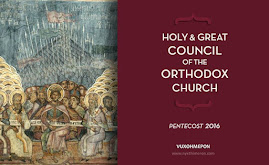
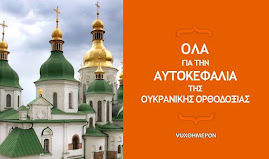
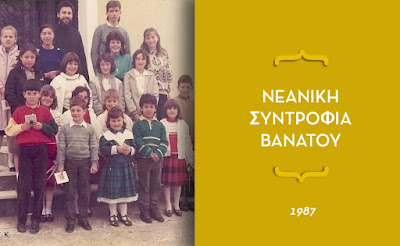
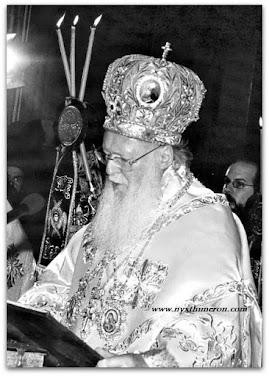





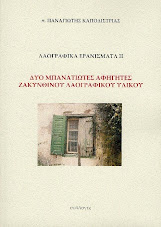
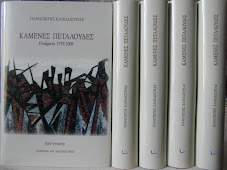

Δεν υπάρχουν σχόλια:
Δημοσίευση σχολίου